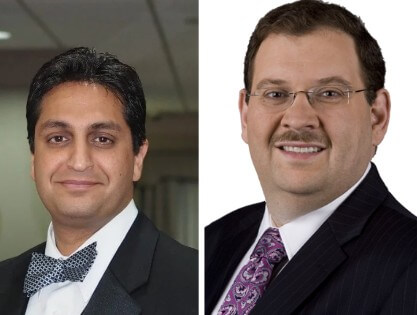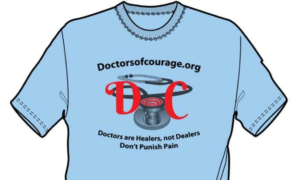They said he was a criminal.
They put him in shackles.
They paraded him through courtrooms, stripped of his white coat, his stethoscope, and his dignity.
But they couldn’t strip him of his truth.
Dr. Neil Anand, a physician who answered the call of duty in the rubble and chaos of September 11th, 2001, was recently convicted in federal court. Another name added to a growing list of physicians pursued relentlessly by the Department of Justice—often with flawed evidence, dubious witnesses, and in courtrooms that increasingly resemble battlefields, not halls of justice.
But in this tale of government overreach and prosecutorial zealotry, there is another, quieter truth rising: physicians are fighting back. And they are beginning to win.
From the Fire: Dr. Anand, a 9/11 Hero
Dr. Anand was a frontline responder during one of the darkest chapters in American history. He stood amid the dust and debris of the World Trade Center collapse, providing care not only with medical skill but with compassion. He did what doctors do: he ran toward pain, not away from it.
Years later, that same physician was targeted by the federal government, accused of crimes tied to pain management and prescription practices—an area where nuance, judgment, and humanity are often bulldozed by algorithms, quotas, and the cold machinery of enforcement.
His conviction stings, not just because of what it means for him, but because of what it means for the future of compassionate, individualized care. His case is a sobering reminder that any physician can become a target, no matter how noble their past or careful their practice.
The Good News: The Arc Is Bending
But bad news rarely stands alone. In the same Eastern District of Pennsylvania that witnessed Dr. Anand’s conviction, a federal judge just opened a door to justice—a door that may allow us to finally challenge the foundations of this unfair system.
On April 9, 2025, Judge Jeffrey L. Schmehl issued an order allowing a physician—myself—to amend a civil complaint against the U.S. Department of Justice and the Drug Enforcement Administration (DEA). The amendment targets the very core of the DEA’s administrative process: the constitutionality of its Administrative Law Judge (ALJ) appointments and removal protections, which have long shielded the agency from transparency and accountability.
For years, the DEA has functioned as judge, jury, and executioner—revoking medical licenses, seizing property, and ending careers without the due process guaranteed by our Constitution. Now, a court is allowing that system to be questioned in full daylight.
This is no small crack. It is a legal earthquake.
The very legal apparatus that has enabled unjust prosecutions is being pulled into question—and it’s happening because physicians are finally fighting back.
Not Guilty: The Case of Dr. Muhamad Aly Rifai
In May 2024, I stood trial in that same federal courthouse. The government had spent years trying to paint me as a criminal. Their case was built on unreliable witnesses, incomplete data, and twisted narratives. They tried to force me into a plea bargain. They threatened. They smeared. They used every tactic in their arsenal to coerce a confession that never came.
I chose to fight. After six days of trial and just a few hours of jury deliberation, the verdict came back: Not Guilty on all charges.
The moment was bittersweet. My name was cleared, yes—but at what cost? Years of my life lost. My practice disrupted. My patients abandoned. My reputation tarnished. My family traumatized.
But the jury saw the truth. And in their verdict, they offered something too rare in this system: vindication. I returned to work. I returned to healing. And now I raise my voice not just for myself, but for every doctor who’s still caught in the storm.
Dr. Loey Kousa: Another Physician, Another Victory
Across the country, another physician, Dr. Loey Kousa, was also forced to fight for her life and career. The government accused her of opioid-related offenses. They marshaled their usual tactics: raids, indictments, media leaks. But when the facts were finally heard in a courtroom, she too was acquitted.
She didn’t fold under pressure. She stood tall. And today, like me, she is back serving her community—a living testament that justice, though delayed, is still possible.
From Plea to Power: The Rebirth of Dr. Jay Joshi
Even those who succumbed to the immense pressure of the federal government—those who took plea deals out of fear, exhaustion, or coercion—are finding a way back.
Dr. Jay Joshi was one of them. A promising young physician and founder of Daily Remedy, he was cornered into a guilty plea. His story is emblematic of the thousands who never see trial, who are told that pleading guilty is the only option if they want to see their families again.
But Dr. Joshi didn’t stay down. He rebuilt. He used his voice, his pen, and his experience to create a platform that advocates for evidence-based reform in pain management and prescription law. Today, his writings and policy proposals influence national conversations. He turned tragedy into testimony—and testimony into transformation.
A Broken System, and the Power to Fix It
The stories of Drs. Anand, Rifai, Kousa, and Joshi are not isolated. They are part of a disturbing trend in which physicians are treated not as healers, but as suspects. A system designed to punish cartels and kingpins has become a weapon against caregivers—especially those who serve vulnerable populations.
The DEA’s unchecked power and its use of secretive administrative courts have made due process a fantasy for many. But with Judge Schmehl’s order allowing a challenge to the DEA’s administrative structure, a new precedent may emerge—one that exposes the unconstitutional nature of this kangaroo court system.
We must build on this momentum.
The Path Forward: Unity, Advocacy, and Legal Reform
If you are a physician reading this—know this: you are not alone.
The system may be intimidating. Prosecutors may come armed with badges, subpoenas, and threats. But they are not omnipotent. When we stand together—when we speak out, support one another, and refuse to be bullied—we become stronger than any agency or institution.
Here is what we must do:
- Challenge unconstitutional administrative processes like those used by the DEA. Repeal the Controlled Substances Act (CSA)
- Refuse unjust plea bargains that destroy careers and fuel false narratives.
- Support acquitted physicians in reclaiming their practice and dignity.
- Educate the public on the difference between healing and criminality.
- Advocate for Congressional oversight of the DEA and its abuse of power.
And above all: we must tell our stories. The government controls the narrative only when we stay silent. But when we speak, when we write, when we reclaim the truth—justice begins to bend our way.
Final Words
Dr. Martin Luther King, Jr. reminded us that “the arc of the moral universe is long, but it bends toward justice.” That bend doesn’t happen by chance. It happens when people refuse to bow. It happens when truth is louder than fear.
We physicians are resilient. We are righteous. And we are done being scapegoats.
From the ashes of prosecution, a movement is rising—fueled not by anger alone, but by hope, by truth, and by the sacred oath we swore to heal, no matter the cost.
Justice is coming.
And we will endure.
Muhamad Aly Rifai, MD, CPE, FACP, FAPA, FACLP, is a Syrian-American psychiatrist, internist, and physician-entrepreneur who has dedicated his life to serving the underserved. A survivor of war-torn Aleppo, Dr. Rifai immigrated to the U.S. and founded Blue Mountain Psychiatry in Pennsylvania, where he has become a pioneer in telepsychiatry, integrated mental health, and addiction treatment. His research has influenced national policy, including linking hepatitis C to psychiatric illness. In 2024, Dr. Rifai was wrongfully prosecuted by the federal government and courageously fought back in court, ultimately being found Not Guilty by a unanimous jury. His case became a symbol of physician resilience and justice. Today, Dr. Rifai advocates for ethical healthcare, due process, and reform in federal oversight of medicine. He serves as a voice for physicians who have been wrongfully targeted and continues to care for patients with compassion, innovation, and unwavering integrity.


So none of this is true ?
Don’t get me wrong…my wife is still suffering and bedridden for the past 5 years due to these “policies”..but this man may not be the best example to bring forth
https://indiawest.com/doctor-convicted-in-extensive-opioid-and-healthcare-fraud-scheme-faces-prison/
None of what they put in this article is true. But it plays on the propaganda in people’s minds, and that is what gets doctors convicted. Neil did everything right. But as you see in this article, the government plays on word choices to make people think something bad is going on. As for the “goody bags”, this shows that once a doctor is targeted, it doesn’t matter what they do, the government will use it against them. The government tells doctors to not use opioids, but to use NSAIDS and other treatments, which is what Neil did. Having your own pharmacy is not illegal. What does it matter what pharmacy the patient uses, they will all bill to insurance. But once targeted, with today’s propaganda against opioids in the jurors’ minds, it is almost impossible to be acquitted. The prosecutor did a piss-poor job in the courtroom, and still Neil got convicted. We were sure, with the lack of proof on the prosecutor’s side that he had done anything wrong, that he would be acquitted. His conviction was purely due to the propaganda.
We will fix that. Learn the truth that no drug causes addiction. Right now they claim 48 million, or 14% of the American population has a substance use disorder. Basically, if you are on an opioid, even for a legitimate reason, you have SUD. That’s what gets doctors like Neil convicted. But no drug is the cause of addiction. I teach the real cause and it is important for people to learn it and teach it to everyone. Our addiction rate is increasing exponentially because they don’t understand the cause. And what they are doing now is actually increasing the addiction rate. So learn and teach.
Thanks for staying in the battle and winning! I will share your article with some doctors still fighting.
Theresa Stanley